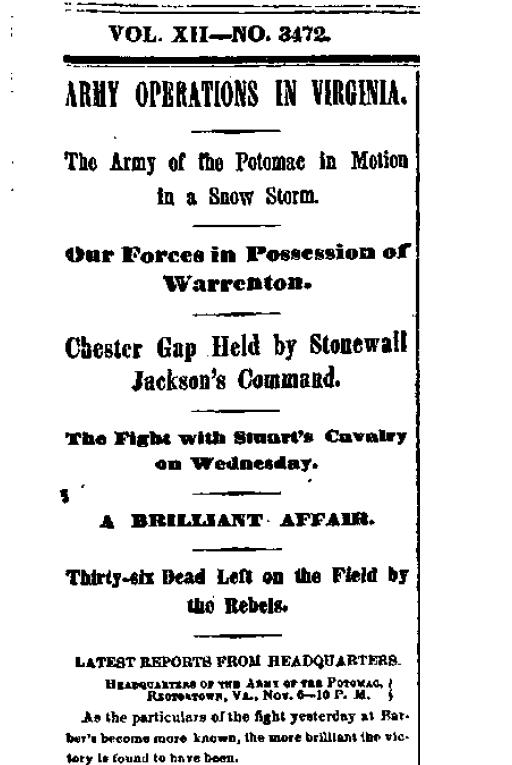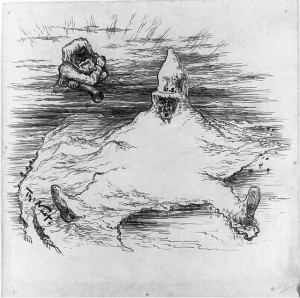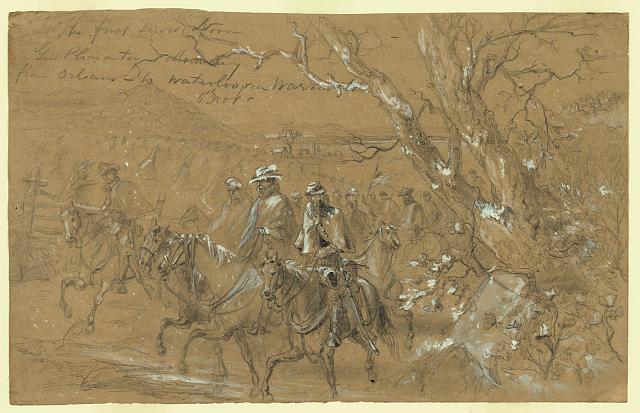The New-York Times was published on this date 150 years ago before word got back North that General McClellan had been relieved of command. It seems ironic that for all the general’s dilly-dallying (from President Lincoln’s perspective), the lead headline of the November 8, 1862 Times pointed out that the Army of the Potomac was indeed moving – in a snowstorm:
Reading Snowflakes?
The storm was apparently a Nor’easter that hit the big city itself on the 7th and was especially rough on the street people whose bedroom was the ‘ash-barrel’.
From The New-York Times November 8, 1862:
THE STORM.; The First Installment of Winter in this City. THE STEAMSHIP SCOTIA DETAINED OUTSIDE. THE STORM ELSEWHERE. AT BALTIMORE. The weather last night was very cold. AT BOSTON. THE WEATHER AT BUFFALO.
John Frost, Esq., a lineal descendant of Haste T. Winter, in the most daring defiance of public desire, flouted fiercely through our streets all day yesterday. What, in the name of all precedent, this ferocious incoming of wintry blasts indicates we know not. Suffice it to say, that argument on its propriety, suggestion as to its desirability, theorizing as to its cause, are of no avail. It came and it conquered.
At 7 o’clock on Friday morning “weather and things” were in a most orderly and serene condition, and the day promised to be a pleasant one. At 10 minutes past 7 the wind whistled fiercely up and down the streets, heavy clouds dashed over the heavens, the sky became darkened, the waters looked like ink, and, like a fretful child, the humor of the day was changed. The snow came thick and fast. It blinded [???] clerks on the way to the store, astonished peaceful milkmen on their “dairy round,” caused the ferry-boat pilots to swear great oaths, nipped the noses of the omnibus drivers, and sent the newsboys’ market away below par.
Lazy risers, who had gone to bed the night before prophesying, from the exquisite coloring of the clear horizon, a perfect day, were astounded by the chilly atmosphere of the morning, amazed at the snowy whirlwind, and dumbfounded by the repeated applications of boys who wanted the job of cleaning off the snow.
The bay and rivers were powerfully agitated all day. The swell was heavy, and the rolling of the ferry-boats made passengers stretch apart their legs, turn pale and sigh for the omnibus or car. The wind had one kind feature, it blew toward the ocean rather than landward.
At noon the gale was at its height. The wind swept vigorously everything and body before it. Umbrellas were turned inside but momentarily; elderly ladies and elderly men were seen to waltz briskly as they approached break corners; people of all sorts and conditions measured their stiffened length upon the icy pavement; overcoats, rubber-shoes, “U.S.C. boots,” furs and uppets, made their appearance; everybody out of doors was cross, and everybody indoors was chilly; chimneys whistled wierd melodies and weathercocks spun unceasingly.
At 6 o’clock P.M., there was a momentary lull — just long enough for the factories, the workshops and stores to disgorge their hands, and then, whew! how the wind came up, how the clothes flew up, how the hats tripped far away from their owners, how red noses became, how blue the air was with curses, and how black, dreary and confoundedly unpleasant the entire metropolis became.
Ten o’clock saw no change, and at midnight the keen cutting of the frosty blast stiffened the limbs of many a wanderer, and chilled the life-blood of many a poor devi[l] whose home is the street, his bedroom the ash-barrel, his pillow the cinder. So absolute a storm has not been known in years. It was north by northeast, and east by northnorth, and if it will only be kind enough to go away, and stay away, and never come back, it will gratify thousands of benumbed citizens, and possibly may be forgiven for its outrageous violation of propriety yesterday.
But it won’t. This is the first installment of Winter. We must now prepare for cold days, deep snows, skating, sleigh-riding, and Winter quarters. The boys of the City are undoubtedly happy, and certain tradesmen very likely keep themselves warm and cheerful by the constant iteration of the adage about the “ill wind,” but it is nevertheless a fact, that such a day as yesterday renders everybody miserable, and everything thoroughly unpleasant.
We learn from our Ship News reporter that the Scotia, which is outside, has not yet made her appearance at Quarantine, and that as the gale does not abate, there is no likelihood of her coming in before early this morning. …



